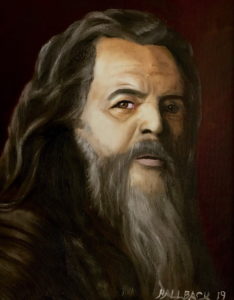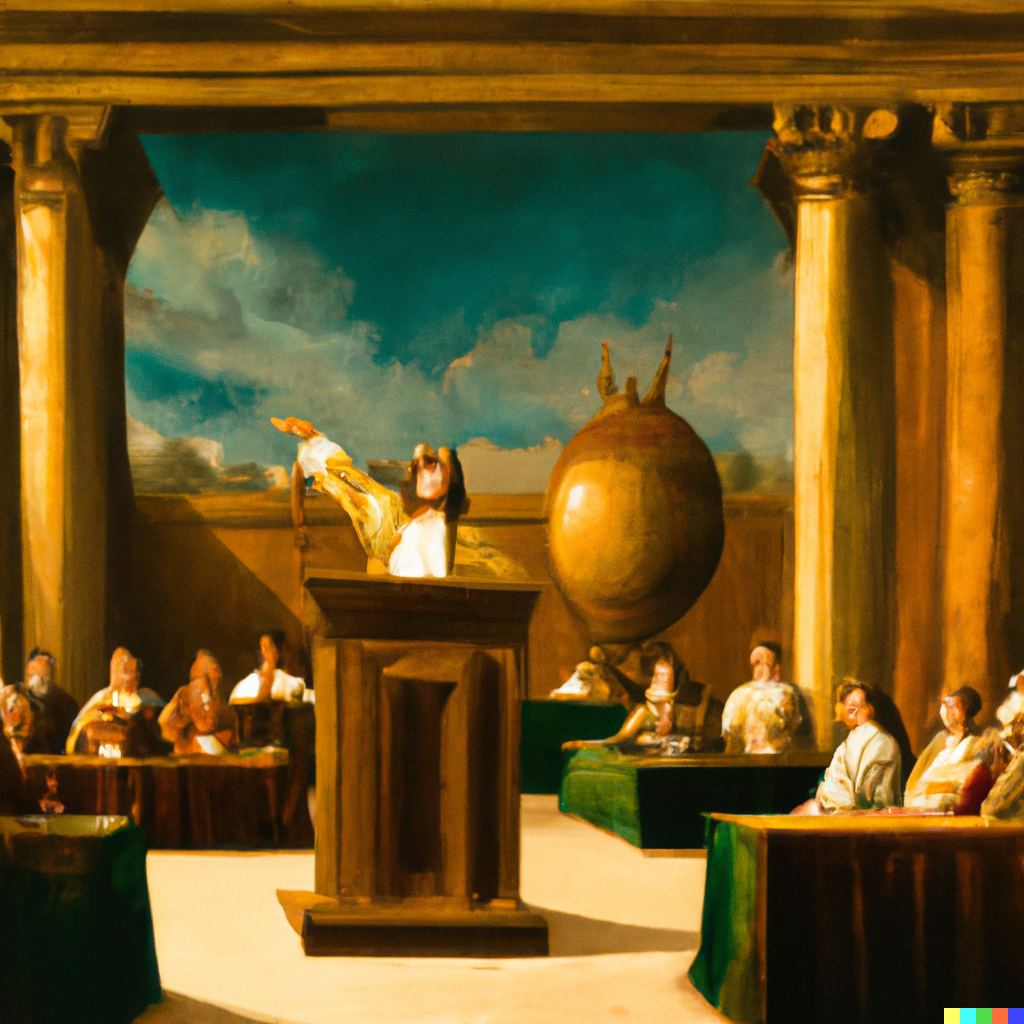
Saved by Faith… Plus the Nicene Creed!
The Reunion Committee knew the right person to give the keynote address just had to be the great theologian Athanasius! His powerful intellect, keen grasp of subtle philosophical issues and his forceful oratory made him the perfect choice. His epic speech “Faith Without Creeds is Dead” may be the most magnificent defense of the Nicene Creed you’ll ever read. His insights and passion truly captured the spirit of Nicea!

The Master of Ceremony’s Introduction of Athanasius was pretty dull and is omitted from this account. The transcript of Athanasius’ glorious speech is presented here in its entirety.
Arius Was a Heretic!
Athanasius: Greetings and blessings to all! Except of course to Arius and his band of heretics who slithered in here somehow and are sitting with us today. How did he get in here anyway? The Reunion committee must have lost its collective mind to let him in! I see his name is even on the program somewhere! I thought we had banned him from everything we could think of! Well no matter, we’ll deal with him again later. Some of you may recall how, after our first council, we burned his books and made it a crime punishable by death to even have a copy of his writings. It makes me a little nostalgic just to think of it. Those were the days!
What About Emperor Constantine?
You may be wondering, where is Emperor Constantine? The Reunion organizers have asked me to inform you that he is doing well. The unfortunate misunderstanding that got him arrested when he tried to check in has been cleared up! He may have lost his bearings for awhile but he’s doing much better now that he’s on medications. We all know it was his will that brought us together in Nicea and it was his power that established our teachings! Thank God for the Emperor! Let us pray for his speedy recovery!
Thank God for the Nicene Council!
It is so remarkable that we are all together again in Caesar’s Palace! Today we want to remember and give thanks for all the wonderful things we said and did in Nicea! Yes, I know there may be critics who whine that all we did was revel in our own intellectualism and sophistication. Well they are simply wrong! They were wrong then and they are still wrong today! You can be sure they will be wrong forever as long as I have anything to say about it! Besides, what’s so wrong with being intellectual and sophisticated anyway?
AUDIENCE: Thunderous applause!
The Nicene Council Preserved the Kingdom of God!
Never forget that it was our work in Nicea that preserved the very kingdom of God from destruction! The wicked heretic and so-called Christian, Arius got what he deserved when we threw him out on his ear! We are forever grateful to Emperor Constantine who paid all our expenses and fed us sumptuously at his table. We should never lose sight of his kindness to the church when he told Roman citizens to quit killing us! It was Constantine, our beloved patron and Emperor, who took our side in the Nicean debate! He pledged the power and might of Rome to our cause, and brethren, that’s as good as it gets!
AUDIENCE: Deafening applause.
The Church Fathers Wrote a Beautiful Creed!
You may be wondering exactly what it was that we did in Nicea to preserve God’s kingdom. What did we accomplish that changed the very course of history? What was our crowning achievement you ask! We wrote a creed and crafted words that could show who is a true believer and who is not! Our words are wonderfully filled with gravity and mystery! (I wrote a lot of it myself by the way) Simply reciting them in public can establish whether you are in or out of God’s Kingdom!
Salvation Depends on the Nicene Creed!
The words we wrote are so important that we decided to establish their authority by majority vote! Our creed must never be disputed even if dimwits like Arius refuse to acknowledge it! We created the undisputed gold standard of faith for untold millions of believers! The Nicene Creed has been the only acceptable way for Christians to think for well over 1500 years now! Thankfully, we have even convinced people that unless they accept our theological formulation they cannot be saved!
AUDIENCE: Enthusiastic shouting and foot stomping.
Many Christians Refused to Believe in the Trinity!
Thank you. Thank you! Most of you remember the situation we faced. There was trouble in the church! There were churches all over the empire and beyond that didn’t agree with each other! To their great shame there were even some people who stubbornly disagreed with me. Far too many of them refused to accept my views about the threefold nature of God.
AUDIENCE: Booing and hissing.
Those Damnable Heretics Rejected Our Creed!
Athanasius: Damnable heretics like Arius and his followers refused to recognize the brilliance of our creation. They would not believe in Jesus the right way, our way! Some did not like the idea of God being three “persons” but one substance! They rattled on about how it is wrong to claim God is a substance or essence in the first place. Well, that was our idea and we like it a lot and so does the Emperor! That pretty much settles it once and for all wouldn’t you say? But Arius and the thickheaded imbeciles who were his companions just wouldn’t go along with us. It didn’t matter though because our ideas became the official dogma of the Roman Empire!
AUDIENCE: Right on Athanasius! God is One! God is Three! Let’s hear it for the Trinity!
The Church Needed Some Platonic Philosophy!
Arius and his accomplices accused us of building our doctrine on a foundation of Platonic philosophy. Well La Ti Da! We told them, “If you don’t like it we’ll excommunicate you! Then to protect the Gospel from people who disagree with us we condemned and banished them! Just for good measure we made it a crime punishable by death to even have a copy of Arius’ writings! How’s that for taking a firm stand for the truth brethren!
AUDIENCE: Bravo! Bravo! Well done!
PS: If you are enjoying the content here at theologyallstars.com please consider sending a link to a friend. Thanks and God Bless.
Copyright 2021 by Bob Shutes
